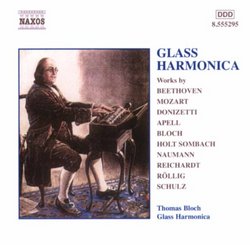| All Artists: Johann Julius Sontag von Holt Sombach, Johann Abraham Peter Schulz Title: Glass Harmonica Members Wishing: 1 Total Copies: 0 Label: Naxos Release Date: 11/20/2001 Genres: Special Interest, Pop, Classical Styles: Vocal Pop, Opera & Classical Vocal, Chamber Music, Historical Periods, Classical (c.1770-1830), Instruments, Electronic Number of Discs: 1 SwapaCD Credits: 1 UPC: 747313529520 |
Search - Johann Julius Sontag von Holt Sombach, Johann Abraham Peter Schulz :: Glass Harmonica
 | Johann Julius Sontag von Holt Sombach, Johann Abraham Peter Schulz Glass Harmonica Genres: Special Interest, Pop, Classical
|
Larger Image |
CD Details |
CD ReviewsInteresting, generally excellent new music guy | NY, NY United States | 04/05/2002 (4 out of 5 stars) "I would disagree with the reviewer below that this is anything more than a curiosity. Even the works on this disc by great composers such as Mozart and Beethoven are generally trivial. At the same time, this is fine playing of a highly unusual instrument by a polished virtuoso. Some of the pieces, however, I could do without. For instance, while Thomas Bloch's playing is excellent, his compositional skills are somewhat lacking. His own original work, complete with overdubbed whiny male soprano, is the disc's finale and sounds more like a corny film soundtrack than anything else. In addition, it must be noted that the performance here of Donizetti's "Mad Scene" from Lucia utilizes possibly the worst soprano ever recorded (short of Florence Foster Jenkins). I wouldn't wish her off-pitch shrieking on my worst enemies." The glass harmonica CD reference M. Hori | 03/16/2002 (5 out of 5 stars) "Any temptation to classify this fascinating disc as a musical curiosity is easily disposed of by a glance at track list. It contains fourteen works, of which seven are world premiere recordings (solo or with various instruments). These range from the eighteenth to the twentieth century. In all of them the glass harmonica features either as a solo instrument, or is combined with voices or less unfamiliar instruments.Thomas Bloch is unquestionably a virtuoso, with all the skills necessary to fulfil the roles of soloist, accompanist and ensemble player.The glass harmonica captured the public imagination, and in the eighteenth and nineteenth centuries around four hundred compositions had been written for it, including works by Mozart, Hasse, Donizetti, Reicha, Beethoven and later Richard Strauss.Mozart was probably the only famous composer to take the glass harmonica seriously enough to write several fairly extended works for it though, as the contemporary pieces on this disc show, its fascination has remained powerful enough to attract some present-day players and composers.The obvious delight of (to me) unknown composers in exploring new sonorities is engagingly displayed in many of the earlier pieces, and also those by von Holt Sombach (b.1962) who unashamedly turns the clock back to a nineteenth century style without indulging in pastiche, and to pleasant effect. Thomas Bloch's own 'Sancta Maria' (modestly placed on the final track) is a satisfying, intensely dramatic setting in a decidedly - though not defiantly - atonal idiom that fully establishes the instrument's right to be seriously considered among the "new sounds" that intrigue so many modern composers. In Bloch's 'Sancta Maria', Fabrice Di Falco's male soprano vocal range is extraordinary.Thomas Bloch's excellent essay on the history and repertoire of the glass harmonica is included with the insert booklet, and well worth reading. Both he and the maker of the instrument used for this recording have interesting web sites..." The reference M. Hori | 03/07/2002 (5 out of 5 stars) "The glass harmonica was developed by Benjamin Franklin in the 18th century and its ethereal (and sometimes eery) tones led to its being called the 'angelic organ'. The sounds it produces can be tender and subtle or shrill and angry. These days it is often dismissed as a novelty - a great mistake as modern composers, like the player on this CD, Thomas Bloch, are writing works of great power for the instrument. When it first appeared the glass harmonica attracted the attention of Mozart and his contemporaries. The CD offers music ranging from the stately and solemn to the bubbling and foot-tapping. There is Beethoven's sole work for the glass harmonica: a one minute melodrama that sounds more like a work from century the 20th than early 19th. You can also hear the mad scene from 'Lucia di Lammermoor' as Donizetti intended - with the glass harmonica playing the part nowadays taken by a brace of flutes. Perhaps the pieces by the living composers Holt Sombach and Thomas Bloch are the most interesting of all, demonstrating the glass harmonica's emotional range in a modern setting. Bloch's 'Sancta Maria' shows off the glass harmonica's capacity for chill, crystalline runs set against rolling bell-like phrases. The work features the extraordinary voice of Fabrice Di Falco, a man whose voice ranges from soprano to baritone. The more you play this piece, the more layers of vocal and musical subtility you discover. Thomas Bloch plays with great skill, extracting a wider range of musical colours and tones from the glass harmonica than any player I have heard before. He also wrote the excellent jacket notes on the history of the glass harmonica. The recording is excellent and, of course, there is the added bonus of the Naxos price. Buy this CD as the perfect introduction to the glass harmonica."
|

 Track Listings (17) - Disc #1
Track Listings (17) - Disc #1